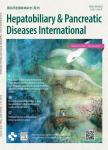Molecular therapy and prevention of hepatocellular carcinoma
Molecular therapy and prevention of hepatocellular carcinoma作者机构:the
出 版 物:《Hepatobiliary & Pancreatic Diseases International》 (国际肝胆胰疾病杂志(英文版))
年 卷 期:2003年第2卷第1期
页 面:11-22页
学科分类:1002[医学-临床医学] 100214[医学-肿瘤学] 10[医学]
主 题:chronic liver diseases epidemiology gene therapy hepatocarcinogenesis immune therapy natural course oncolytic viruses primary prevention secondary prevention
摘 要:Hepatocellular carcinoma (HCC) is one of the most common malignant tumors in some areas of the world with an extremely poor prognosis. The major etiologic risk factors for HCC development include hepatitis B virus (HBV) and hepatitis C virus (HCV) infection, toxins (alcohol, aflatoxin BI) and various inherited metabolic liver diseases, such as hemochromatosis and alpha-1-antitrypsin deficiency. Central to the molecular pathogenesis of HCC are mutations of various genes and genetic/chromosomal instability that result from chronic liver disease and the associated enhanced liver cell regeneration and mitotic activity. Alterations in the structure or expression of several tumor suppressor genes and oncogenes have been described. In addition, mechanisms leading to genetic instability due to mismatch repair deficiency or chromosomal instability and aneuploidy due to defective chromosomal segregation appear to be involved. The prognosis of HCC patients is generally very poor. Most studies have shown a five-year survival rate of less than 5% in symptomatic patients. HCC has been found to be quite resistant to radio- or chemotherapy. Investigations of the natural history and clinical course of HCC revealed a long-term survival of patients only with small asymptomatic HCC that could be treated surgically or nonsurgically. For patients with advanced symptomatic HCC, novel therapeutic strategies such as gene therapy are urgently needed. Apart from exploring and refining new HCC treatment strategies, the implementation of the existing measures or the development of novel measures to prevent HCC is most important. Primary HCC prevention could have a major impact on the incidence of HCC. Further, secondary prevention of a local recurrence or of new HCC lesions in patients after successful surgical or nonsurgical HCC treatment is of paramount importance and is expected to significantly improve disease-free and overall survival rates of patients. Based on rapid scientific advanc




